Politics
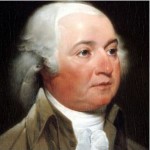
 Historians, who have studied the lives of Presidents John Adams and Thomas Jefferson, agree that while the two men were friends, they also had a long history as “frenemies.” It is fairly common with politicians, because each one has definite ideas about how things should be run. So, the two rivals always had a volatile relationship.
Historians, who have studied the lives of Presidents John Adams and Thomas Jefferson, agree that while the two men were friends, they also had a long history as “frenemies.” It is fairly common with politicians, because each one has definite ideas about how things should be run. So, the two rivals always had a volatile relationship.
Their friendship began in the early days of the nation, despite their vastly different political views. Adams was a strong believer in a strong central government, and Jefferson championed states’ rights. I would imagine that there was a measure of frustration for Adams, as he watched his administration being dismantled in the early years of the Jefferson administration. Nevertheless, as a Conservative, I have to agree with the Thomas Jefferson way of government.
Adams preceded Jefferson as president friend 1797 to 1800. During the Adams presidency, it became very apparent that the two men were very different, and their political views were just as different. The hot-tempered Adams was a firm believer in a strong centralized government, while the genteel Jefferson believed federal government should take a more hands-off approach and defer to individual states’ rights. They clashed loudly and often. As Adams’ vice president, Jefferson was horrified by what he considered to be Adams’ abuse 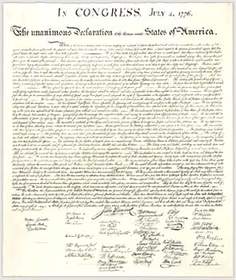 of the presidential power…particularly his passage of the restrictive Alien and Sedition Acts of 1798. Jefferson abandoned Adams and Washington for his estate at Monticello. There, he plotted how to bring his Republican faction back into power in the presidential election of 1800. After an exceptionally bitter campaign, in which both parties engaged in slanderous attacks on each other in print, Jefferson emerged victorious. It appeared the former friends would be eternal enemies. The former revolutionaries went on to resume their friendship over 14 years of correspondence during their golden years.
of the presidential power…particularly his passage of the restrictive Alien and Sedition Acts of 1798. Jefferson abandoned Adams and Washington for his estate at Monticello. There, he plotted how to bring his Republican faction back into power in the presidential election of 1800. After an exceptionally bitter campaign, in which both parties engaged in slanderous attacks on each other in print, Jefferson emerged victorious. It appeared the former friends would be eternal enemies. The former revolutionaries went on to resume their friendship over 14 years of correspondence during their golden years.
On July 4, 1826, the 50th anniversary of the adoption of The Declaration of Independence, these “frenemies” died on the same day and within five hours of each other. Jefferson and Adams were the last surviving members of the original American revolutionaries who had stood up to the British empire and forged a new political system in the former colonies. When Adams died at the age of 90, his last words, as the country celebrated Independence Day were, “Thomas Jefferson still survives.” Adams was wrong. Jefferson had died five hours earlier at Monticello at the age of 83.

 This year, mostly because of the year of the Covid-19 lockdowns, Americans are so ready to get out there. Whether we choose to wear a mask or not, we are done with staying home, small groups, missed holidays, and mostly…Covid-19!! Bob and I were blessed in that we were able to travel to the Black Hills for the Independence Day holiday last year, but many states didn’t allow it. Now…suddenly, many states are open. Of course, there are those who want us to keep things to small groups, or better yet, just stay home and don’t celebrate at all. Our answer to that, “No!! We are done with giving up our freedom!!” This nation, “One Nation Under God,” was founded on the principles of “liberty and justice for all” and “let freedom ring.” Our soldiers died to make sure that we continued to have that freedom. And we are not giving it up now!!
This year, mostly because of the year of the Covid-19 lockdowns, Americans are so ready to get out there. Whether we choose to wear a mask or not, we are done with staying home, small groups, missed holidays, and mostly…Covid-19!! Bob and I were blessed in that we were able to travel to the Black Hills for the Independence Day holiday last year, but many states didn’t allow it. Now…suddenly, many states are open. Of course, there are those who want us to keep things to small groups, or better yet, just stay home and don’t celebrate at all. Our answer to that, “No!! We are done with giving up our freedom!!” This nation, “One Nation Under God,” was founded on the principles of “liberty and justice for all” and “let freedom ring.” Our soldiers died to make sure that we continued to have that freedom. And we are not giving it up now!!
The Covid-19 lockdowns were never designed to make us healthier, but rather to take our freedoms, and we aren’t going to take it anymore. They still want us to stay home, but everyone I know of has opted to go out and celebrate or have people in to celebrate. We all agree that our forefathers never intended for the people of this nation to give up their rights to “kowtow” to the government!! Especially when the disease has a 97% survival rate!! And believe me when I say that no one is saying that it didn’t kill people, but that many of the people in lockdown would not have become sick, much less died. The Lockdown did nothing but hurt our economy, and rob us if our freedom.
This year is a “new year” for this nation. We are ready to take back our country and our freedom. We know who stole it, and we know who didn’t. We are excited about getting back out there and celebrating our nation’s birthday again!!  This is a great nation, and we will not allow it to be stolen from us. We are ready to fight for our freedom again, and we refuse to be pushed back.
This is a great nation, and we will not allow it to be stolen from us. We are ready to fight for our freedom again, and we refuse to be pushed back.
From the brave men and women who fought for the freedom of this nation in the Revolutionary War, to the brave men and women who will fight for it again, I honor you!! You are the epitome of greatness!! You don’t give up. This is our nation and this is our Independence Day!! I pray that each of you has a wonderful holiday with family and friends. Let’s get out there and be independent again!! God bless you all and God bless America!!
 Hans Island is a desolate little rock of an island locate near Greenland in the center of what is known as the Kennedy Channel of Nares Strait. This is the strait that separates Ellesmere Island from northern Greenland and connects Baffin Bay with the Lincoln Sea. The island is barren and uninhabited, measuring 0.5 square mile, 4,230 feet long and 3,934 feet wide. Hans Island is the smallest of three islands in Kennedy Channel off the Washington Land coast; the others are Franklin Island and Crozier Island. The strait at this point is 22 miles wide, placing the island within the territorial waters of both Canada and Greenland (Denmark). Technically, a line in the middle of the strait goes through the island.
Hans Island is a desolate little rock of an island locate near Greenland in the center of what is known as the Kennedy Channel of Nares Strait. This is the strait that separates Ellesmere Island from northern Greenland and connects Baffin Bay with the Lincoln Sea. The island is barren and uninhabited, measuring 0.5 square mile, 4,230 feet long and 3,934 feet wide. Hans Island is the smallest of three islands in Kennedy Channel off the Washington Land coast; the others are Franklin Island and Crozier Island. The strait at this point is 22 miles wide, placing the island within the territorial waters of both Canada and Greenland (Denmark). Technically, a line in the middle of the strait goes through the island.
Most people would look at this island and say, “Ok, it is technically half Canadian and half Greenland (Denmark), but seriously, who cares?” It is a piece of rock that has no value, so there it is and nobody cares. The problem is that…oddly, both sides care…a great deal. You might be wondering why, at this point. Well, you would not be alone. I am wondering why too. For some reason, Canada and Denmark have been…well, playfully fighting over the control of this little piece of ground. Every so often, when officials from each country visit, they leave a bottle of their country’s liquor as a…power move. It really makes no sense. The island has no reserves of oil or natural gas, or anything else that would make it valuable, and yet it is the subject of an ongoing territorial dispute between Denmark and Canada over who owns this little rock…and it’s such an odd dispute at that. It will barely increase the respective countries’ land mass and yet they continue to “fight” over it.
Unlike many other territory conflicts, this one is fought in a markedly peaceful way. The potential serious diplomatic implications aside, the Canadians and Danes take turns placing their flags on the island. This curious practice that has been going on since the 1980s. But it gets even odder. The island was first disputed in 1933, but largely forgotten during World War II. The unusual dispute began again in earnest in 1984 when, during a visit to the island, the Danish Minister for Greenland planted the national flag and left a message saying “Welcome to the Danish island” (“Velkommen til den danske ø” in Danish) along with (it is said) a bottle of brandy. Ever since then, when the flag on the island is periodically changed between the Danish and Canadian flag, the bottle is also replaced. The Canadians leave a bottle of Canadian Club and the Danes a bottle of schnapps.
While the conflict is “lighthearted,” it is really a serious conflict, and remains unresolved today. At one point, it looked like they might have a solution. On May 4, 2008, an international group of scientists from Australia, Canada, Denmark, and the UK installed an automated weather station on Hans Island. To me that makes the most sense. Just share the island or let it be considered international. That isn’t exactly what happened, however. There were a number of people who think that there might be some minerals on Hans Island, making 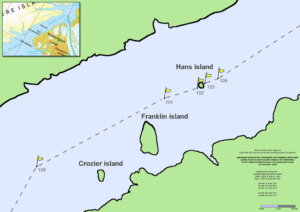 it a possible valuable island after all…and renewing the conflict. Oh boy, here we go again.
it a possible valuable island after all…and renewing the conflict. Oh boy, here we go again.
The conflict is as of today still unresolved, but there are suggestions on how to move forward. Arctic experts from Canada and Denmark propose making Hans Island into a condominium, a solution that has proven to resolve other conflicts in the past. I wasn’t sure what that was, but basically it is an agreement to share the island. It sometimes works temporarily, but usually doesn’t work long term. Most nations, Canada and Denmark included don’t like the idea of giving up their sovereignty. Time will tell, I guess, but if you ask me, the whole thing is…well, it’s just comical.
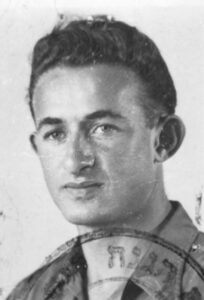 What would you do if your life had been ripped apart by a group of people who really knew nothing about you or your people, but hated you and them anyway. That was the position in which Joseph Harmatz found himself. Born in Rokiškis, Lithuania into a prosperous family, Harmatz and his family were transferred to the Vilnius Ghetto on January 23, 1925, after the occupation of Lithuania by Nazi Germany. It was the worst time in his life. His youngest brother and all of his grandparents were killed and his older brother died during a military action. His despondent father committed suicide. Harmatz was left alone with his mother at the age of 16. He couldn’t stand the way things were, so he left the ghetto through the sewers and joined a band of guerrillas fighting the Nazis. Harmatz managed to survive the Holocaust, and after the war, he became part of Nakam (Hebrew for Revenge) also known as the Avengers. The Nakam was a group of 50 former underground fighters led by Abba Kovner. Their goal was to avenge the deaths of the six million Jewish victims of Nazi extermination efforts in the Holocaust. The true goal according to Harmatz was to facilitate the death of as many Germans as possible, with the group planning “to kill six million Germans, one for every Jew slaughtered by the Germans,” acknowledging that the effort “was revenge, quite simply. Were we not entitled to our revenge, too?”
What would you do if your life had been ripped apart by a group of people who really knew nothing about you or your people, but hated you and them anyway. That was the position in which Joseph Harmatz found himself. Born in Rokiškis, Lithuania into a prosperous family, Harmatz and his family were transferred to the Vilnius Ghetto on January 23, 1925, after the occupation of Lithuania by Nazi Germany. It was the worst time in his life. His youngest brother and all of his grandparents were killed and his older brother died during a military action. His despondent father committed suicide. Harmatz was left alone with his mother at the age of 16. He couldn’t stand the way things were, so he left the ghetto through the sewers and joined a band of guerrillas fighting the Nazis. Harmatz managed to survive the Holocaust, and after the war, he became part of Nakam (Hebrew for Revenge) also known as the Avengers. The Nakam was a group of 50 former underground fighters led by Abba Kovner. Their goal was to avenge the deaths of the six million Jewish victims of Nazi extermination efforts in the Holocaust. The true goal according to Harmatz was to facilitate the death of as many Germans as possible, with the group planning “to kill six million Germans, one for every Jew slaughtered by the Germans,” acknowledging that the effort “was revenge, quite simply. Were we not entitled to our revenge, too?”
Their main target was Stalag XIII-D, a prisoner-of-war camp built on what had been the Nazi party rally grounds in Nuremberg. Interned in the camp were 12,000 members of the SS (Schutzstaffel or Protection Squads). These prisoners were involved in running concentration camps and other aspects of the Final 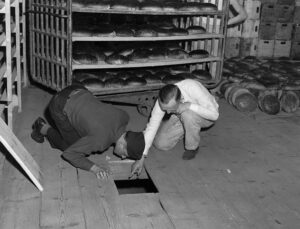 Solution…Nazi Germany’s horrific policy of deliberate and systematic genocide across German-occupied Europe. In April 1946, a member of the Nakam got a job as a baker, and he had a plan. He baked arsenic into 3,000 loaves of bread that were to be fed to the prisoners. Nearly 2,000 prisoners became ill and were thought to be seriously ill. American authorities thought that the arsenic had got onto the crust of the bread by accident, having been used as an insecticide in the wheat fields. During the investigation, United States Army investigators found enough arsenic to have killed 60,000 people and Nakam claimed they had killed several hundred victims, but declassified documents obtained by Associated Press in 2016 stated there were no casualties.
Solution…Nazi Germany’s horrific policy of deliberate and systematic genocide across German-occupied Europe. In April 1946, a member of the Nakam got a job as a baker, and he had a plan. He baked arsenic into 3,000 loaves of bread that were to be fed to the prisoners. Nearly 2,000 prisoners became ill and were thought to be seriously ill. American authorities thought that the arsenic had got onto the crust of the bread by accident, having been used as an insecticide in the wheat fields. During the investigation, United States Army investigators found enough arsenic to have killed 60,000 people and Nakam claimed they had killed several hundred victims, but declassified documents obtained by Associated Press in 2016 stated there were no casualties.
According to Harmatz’s son, his father had no regret for his attempts to kill the German prisoners. He said he was only “sorry that it didn’t work.” Harmatz wrote a book in 1998, called “From the Wings” in which he stated that the poisoning plot had the approval of Chaim Weizmann, though David Ben-Gurion and Zalman Shazar were both against the plan. An earlier attempt to poison the water in a number of German cities failed after  Kovner was arrested by British forces on a ship on which the poison had been hidden, and had been thrown overboard to prevent its capture. The group was so filled with hatred that they wanted all Germans killed, even if they had nothing to do with the Holocaust. Looking back, after much soul searching, Harmatz was thankful that the plot to poison the water supplies in German cities had failed, saying that it “would have harmed efforts to create an incipient State of Israel and would have led to charges of moral equivalence between actions of Germans and Jews. Another effort to kill Nazi war criminals on trial at Nuremberg failed when the group was unable to find any US Army guards willing to participate.”
Kovner was arrested by British forces on a ship on which the poison had been hidden, and had been thrown overboard to prevent its capture. The group was so filled with hatred that they wanted all Germans killed, even if they had nothing to do with the Holocaust. Looking back, after much soul searching, Harmatz was thankful that the plot to poison the water supplies in German cities had failed, saying that it “would have harmed efforts to create an incipient State of Israel and would have led to charges of moral equivalence between actions of Germans and Jews. Another effort to kill Nazi war criminals on trial at Nuremberg failed when the group was unable to find any US Army guards willing to participate.”
Harmatz emigrated to Israel in 1950, and worked to aid Jews resettling from countries around the world. He headed World ORT, a Jewish non-profit organization that promotes education and training in communities around the world, from 1960 to 1994. A long-time resident of Tel Aviv, Harmatz died at at his home on September 22, 2016. He was 91 years old, and was survived by two sons.
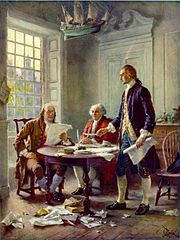 When the British Colonies, also known as the Thirteen Colonies or the early United States, were founded in the 1600s, the colonies were left to govern themselves for the most part. The land was really an expansion of power for Britain. Nevertheless, there were wars that took place in the new land and with them the costs of war, and because the colonies were owned by the British government, the cost of war fell on them. The cost of victory in the 1754 to 1763 French and Indian War and the 1756 to 1763 Seven Years’ War left the British government deeply in debt. The wars were fought in the colonies, but were equipped and populated with the British forces stationed there, at the cost of millions of British funds. The British government decided to impose The Stamp Act and Townshend Acts to pay for the wars, which provoked colonial opposition and unrest, leading to the 1770 Boston Massacre and 1773 Boston Tea Party. Then, came the Intolerable Acts, meant to punish the Massachusetts colonists for their defiance in the Tea Party protest in reaction to changes in taxation by the British Government, in spring 1774 upon Massachusetts. It was enough. These acts took away self-governance and rights that Massachusetts had enjoyed since its founding, and triggered outrage and indignation in the Thirteen Colonies, and twelve colonies sent delegates to the First Continental Congress, from September 5, 1774 to October 26, 1774. Their goal was to draft a petition to the King and organize a boycott of British goods. It was these acts…the acts that took away self-governance and other rights that triggered outrage and indignation in the Thirteen Colonies. We have often heard it called “taxation without representation” and it would never be tolerated. This nation had tasted freedom, and would never go back. These acts were key developments in the outbreak of the American Revolutionary War in April 1775.
When the British Colonies, also known as the Thirteen Colonies or the early United States, were founded in the 1600s, the colonies were left to govern themselves for the most part. The land was really an expansion of power for Britain. Nevertheless, there were wars that took place in the new land and with them the costs of war, and because the colonies were owned by the British government, the cost of war fell on them. The cost of victory in the 1754 to 1763 French and Indian War and the 1756 to 1763 Seven Years’ War left the British government deeply in debt. The wars were fought in the colonies, but were equipped and populated with the British forces stationed there, at the cost of millions of British funds. The British government decided to impose The Stamp Act and Townshend Acts to pay for the wars, which provoked colonial opposition and unrest, leading to the 1770 Boston Massacre and 1773 Boston Tea Party. Then, came the Intolerable Acts, meant to punish the Massachusetts colonists for their defiance in the Tea Party protest in reaction to changes in taxation by the British Government, in spring 1774 upon Massachusetts. It was enough. These acts took away self-governance and rights that Massachusetts had enjoyed since its founding, and triggered outrage and indignation in the Thirteen Colonies, and twelve colonies sent delegates to the First Continental Congress, from September 5, 1774 to October 26, 1774. Their goal was to draft a petition to the King and organize a boycott of British goods. It was these acts…the acts that took away self-governance and other rights that triggered outrage and indignation in the Thirteen Colonies. We have often heard it called “taxation without representation” and it would never be tolerated. This nation had tasted freedom, and would never go back. These acts were key developments in the outbreak of the American Revolutionary War in April 1775.
The Revolutionary War was not going to be a short war. It would rage from April 19, 1775 to September 3, 1783…eight long years. For seven years after the United States Declaration of Independence was adopted by the Second Continental Congress at its meeting in Philadelphia, Pennsylvania, on July 4, 1776, the war still raged on. I don’t suppose any nation would want to simply lay down its control, but the reality is that Britain had lost its control many years before, and it was time to cut their losses and go home.
It was on June 11, 1776, that the Continental Congress made the decision and selected Thomas Jefferson of Virginia, John Adams of Massachusetts, Benjamin Franklin of Pennsylvania, Roger Sherman of Connecticut and Robert R. Livingston of New York to draft our Declaration of Independence. That moment truly sealed the fate of the Britain ownership of this nation. The words they penned would be taught in schools, put on documents, t-shirts, decals, and many other forms of media. Because John Adams knew of Thomas Jefferson’s prowess with a pen, he urged him to author the first draft of the document, which was then carefully revised by Adams and Franklin before being given to Congress for review on June 28. I don’t know how many have ever read the entire Declaration of Independence, but I have chosen to place it in its unedited entirety, because I think we need to know why our founding fathers fought so hard for our independence. The 4th of July is not about picnics and fireworks, it is about freedom, and we must never forget that…nor the five men who wrote it and the entire congress who signed it.
The Declaration of Independence
“When in the Course of human events, it becomes necessary for one people to dissolve the political bands which have connected them with another, and to assume among the powers of the earth, the separate and equal station to which the Laws of Nature and of Nature’s God entitle them, a decent respect to the opinions of mankind requires that they should declare the causes which impel them to the separation.
We hold these truths to be self-evident, that all men are created equal, that they are endowed by their Creator with certain unalienable Rights, that among these are Life, Liberty and the pursuit of Happiness.–That to secure these rights, Governments are instituted among Men, deriving their just powers from the consent of the governed, –That whenever any Form of Government becomes destructive of these ends, it is the Right of the People to alter or to abolish it, and to institute new Government, laying its foundation on such principles and organizing its powers in such form, as to them shall seem most likely to effect their Safety and Happiness. Prudence, indeed, will dictate that Governments long established should not be changed for light and transient causes; and accordingly all experience hath shewn, that mankind are more disposed to suffer, while evils are sufferable, than to right themselves by abolishing the forms to which they are accustomed. But when a long train of abuses and usurpations, pursuing invariably the same Object evinces a design to reduce them under absolute Despotism, it is their right, it is their duty, to throw off such Government, and to provide new Guards for their future security.–Such has been the patient sufferance of these Colonies; and such is now the necessity which constrains them to alter their former Systems of Government. The history of the present King of Great Britain is a history of repeated injuries and usurpations, all having in direct object the establishment of an absolute Tyranny over these States. To prove this, let Facts be submitted to a candid world.
He has refused his Assent to Laws, the most wholesome and necessary for the public good.
He has forbidden his Governors to pass Laws of immediate and pressing importance, unless suspended in their operation till his Assent should be obtained; and when so suspended, he has utterly neglected to attend to them.
He has refused to pass other Laws for the accommodation of large districts of people, unless those people would relinquish the right of Representation in the Legislature, a right inestimable to them and formidable to tyrants only.
He has called together legislative bodies at places unusual, uncomfortable, and distant from the depository of their public Records, for the sole purpose of fatiguing them into compliance with his measures.
He has dissolved Representative Houses repeatedly, for opposing with manly firmness his invasions on the rights of the people.
He has refused for a long time, after such dissolutions, to cause others to be elected; whereby the Legislative powers, incapable of Annihilation, have returned to the People at large for their exercise; the State remaining in the mean time exposed to all the dangers of invasion from without, and convulsions within.

He has endeavoured to prevent the population of these States; for that purpose obstructing the Laws for Naturalization of Foreigners; refusing to pass others to encourage their migrations hither, and raising the conditions of new Appropriations of Lands.
He has obstructed the Administration of Justice, by refusing his Assent to Laws for establishing Judiciary powers.
He has made Judges dependent on his Will alone, for the tenure of their offices, and the amount and payment of their salaries.
He has erected a multitude of New Offices, and sent hither swarms of Officers to harrass our people, and eat out their substance.
He has kept among us, in times of peace, Standing Armies without the Consent of our legislatures.
He has affected to render the Military independent of and superior to the Civil power.
He has combined with others to subject us to a jurisdiction foreign to our constitution, and unacknowledged by our laws; giving his Assent to their Acts of pretended Legislation:
For Quartering large bodies of armed troops among us:
For protecting them, by a mock Trial, from punishment for any Murders which they should commit on the Inhabitants of these States:
For cutting off our Trade with all parts of the world:
For imposing Taxes on us without our Consent:
For depriving us in many cases, of the benefits of Trial by Jury:
For transporting us beyond Seas to be tried for pretended offences
For abolishing the free System of English Laws in a neighbouring Province, establishing therein an Arbitrary government, and enlarging its Boundaries so as to render it at once an example and fit instrument for introducing the same absolute rule into these Colonies:
For taking away our Charters, abolishing our most valuable Laws, and altering fundamentally the Forms of our Governments:
For suspending our own Legislatures, and declaring themselves invested with power to legislate for us in all cases whatsoever.
He has abdicated Government here, by declaring us out of his Protection and waging War against us.
He has plundered our seas, ravaged our Coasts, burnt our towns, and destroyed the lives of our people.
He is at this time transporting large Armies of foreign Mercenaries to compleat the works of death, desolation and tyranny, already begun with circumstances of Cruelty & perfidy scarcely paralleled in the most barbarous ages, and totally unworthy the Head of a civilized nation.
He has constrained our fellow Citizens taken Captive on the high Seas to bear Arms against their Country, to become the executioners of their friends and Brethren, or to fall themselves by their Hands.
He has excited domestic insurrections amongst us, and has endeavoured to bring on the inhabitants of our frontiers, the merciless Indian Savages, whose known rule of warfare, is an undistinguished destruction of all ages, sexes and conditions.
In every stage of these Oppressions We have Petitioned for Redress in the most humble terms: Our repeated Petitions have been answered only by repeated injury. A Prince whose character is thus marked by every act which may define a Tyrant, is unfit to be the ruler of a free people.
Nor have We been wanting in attentions to our Brittish brethren. We have warned them from time to time of attempts by their legislature to extend an unwarrantable jurisdiction over us. We have reminded them of the circumstances of our emigration and settlement here. We have appealed to their native justice and magnanimity, and we have conjured them by the ties of our common kindred to disavow these usurpations, which, would inevitably interrupt our connections and correspondence. They too have been deaf to the voice of justice and of consanguinity. We must, therefore, acquiesce in the necessity, which denounces our Separation, and hold them, as we hold the rest of mankind, Enemies in War, in Peace Friends.
We, therefore, the Representatives of the united States of America, in General Congress, Assembled, appealing to the Supreme Judge of the world for the rectitude of our intentions, do, in the Name, and by Authority of the good People of these Colonies, solemnly publish and declare, That these United Colonies are, and of Right  ought to be Free and Independent States; that they are Absolved from all Allegiance to the British Crown, and that all political connection between them and the State of Great Britain, is and ought to be totally dissolved; and that as Free and Independent States, they have full Power to levy War, conclude Peace, contract Alliances, establish Commerce, and to do all other Acts and Things which Independent States may of right do. And for the support of this Declaration, with a firm reliance on the protection of divine Providence, we mutually pledge to each other our Lives, our Fortunes and our sacred Honor.”
ought to be Free and Independent States; that they are Absolved from all Allegiance to the British Crown, and that all political connection between them and the State of Great Britain, is and ought to be totally dissolved; and that as Free and Independent States, they have full Power to levy War, conclude Peace, contract Alliances, establish Commerce, and to do all other Acts and Things which Independent States may of right do. And for the support of this Declaration, with a firm reliance on the protection of divine Providence, we mutually pledge to each other our Lives, our Fortunes and our sacred Honor.”
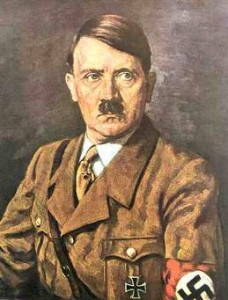
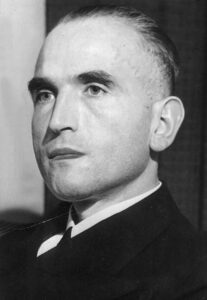 Not everyone was surprised at the coming murders of the Jews during the Holocaust. People hoped that the rumors were wrong, and that maybe they war would end before things got that bad, but most knew that if something wasn’t done, things were going to get ugly at some point. In the end, the non-Jews were forced to make a decision…take a stand, or stand by and watch millions of people die.
Not everyone was surprised at the coming murders of the Jews during the Holocaust. People hoped that the rumors were wrong, and that maybe they war would end before things got that bad, but most knew that if something wasn’t done, things were going to get ugly at some point. In the end, the non-Jews were forced to make a decision…take a stand, or stand by and watch millions of people die.
A Danish ambulance driver in Copenhagen, Denmark huddled over a local phone book, circling Jewish names. He had heard that all of Denmark’s Jews were going to be deported, and he knew this was his “moment of truth.” He knew he had to warn every one of these people, before it was too late. He wasn’t alone. Hundreds of everyday Danes sprang into action in late September 1943. They all had one collective goal in mind…to help their Jewish friends and neighbors escape the horrors they knew were coming.
The plan was amazing. Hundreds of people helped Jewish people sneak out of Copenhagen and other towns. They quickly headed toward Danish shores and into the crowded holds of tiny fishing boats. Denmark was about to pull off a spectacular feat…the rescue of the vast majority of its Jewish population. Within a few hours of learning that the Nazis intended to wipe out Denmark’s Jews, nearly all of the Danish Jews had gone into hiding. Within a few days, most of them had escaped Denmark to neutral Sweden. In the end, over 90% of the Danish Jews were snatched out of the hands of Adolf Hitler and his goons, and it was all thanks to ordinary Danes, most of whom refused to accept credit for their ations. I call it a miracle, and the participants…angels!!
The German forces invaded Denmark in April 1940. The Danish government, rather than suffer an inevitable defeat by fighting back, didn’t resist the Nazi hoard. Instead, the Danish government negotiated with the Germans to insulate Denmark from the occupation. In the negotiations, the Nazis promised to be lenient with the country, respecting its rule and neutrality…like they would ever keep that promise. By 1943, tensions had reached a breaking point. Workers began to sabotage the war effort and the Danish resistance ramped up their efforts to fight the Nazis. In response, the Nazis told the Danish government to institute a harsh curfew, forbid public assemblies, and punish saboteurs with death. The Danish government refused, so the Nazis dissolved the government and established martial law.
The Nazis had always been a forbidding presence in Denmark, but now they began really making their presence known. Like everywhere else, the Danish Jews were to be their first targets. The Holocaust was spreading across occupied Europe, and without the protection of the Danish government, which had done its best to shield Jews from the Nazis after realizing that the Nazi promises were worthless, Denmark’s Jewish population was in danger. In late September 1943, the Nazis got word from Berlin that it was time to rid Denmark of its Jews. As was typical for the Nazis, they planned the raid to coincide with a significant Jewish holiday…in this case, Rosh Hashanah, the Jewish New Year. Marcus Melchior, a rabbi, got word of the coming raid, and in Copenhagen’s main synagogue, he interrupted services. Melchior said, “We have no time now to continue prayers. We have news that this coming Friday night, the night between the first and second of October, the Gestapo will come and arrest all Danish Jews.” Melchior told the congregation that the Nazis had the names and addresses of every Jew in Denmark, and urged them to flee or hide.
Denmark’s panicked Jewish population sprang into action, but against all odds, so did its Gentiles. Hundreds of people spontaneously began to tell Jews about the upcoming action and help them go into hiding. It was, in the words of historian Leni Yahil, “a living wall raised by the Danish people in the course of one night.” It was amazing, and it can only be classified as a miracle. The Gentile people of Denmark were taking their lives into their own hands too, but they did not care, nor did they consider the cost. All they saw was the horrific injustice of the Nazi plan, and they could not abide by it.
No pre-existing plan had been put in place by the Danish people, but the Jewish people needed their help and nearby Sweden offered an obvious haven to those who were about to be deported. Sweden was still neutral and unoccupied by the Nazis, and they were a fierce ally. It was also close. Some areas of Denmark were just over three miles away from the Swedish coast. Once across, the Jews could apply for asylum there. The Danish culture has long been seafaring, in fact since Viking times. That said, there were plenty of fishing boats and other vessels to spirit Jews toward Sweden. But Danish fishermen were worried about losing their livelihoods and being punished by the Nazis if they were caught. So, rather than put their countrymen in peril, the resistance groups that swiftly formed to help the Jews managed to negotiate standard fees for Jewish passengers, then recruit volunteers to raise the money for passage. That way the fishermen got paid for their risk. The average price of passage to Sweden cost up to a third of a worker’s annual salary.
As often happens, there were fishermen who took advantage of the situation, but more who refused pay, acting without regard to personal gain. Boats were used for some 7,000 Danish Jews who fled to safety in neighboring Sweden. Passage was a terrifying ordeal. Jews gathered in fishing towns, hid on small boats, usually 10 to 15 at a time, giving their children sleeping pills and sedatives to keep them from crying, and struggled to maintain control during the hour-long crossing. Some boats, like the Gerda III, were boarded by Gestapo patrols. Gas came from strange sources. Careful rationing by groups like the “Elsinore Sewing Club,” a resistance unit, helped a few hundred Jews make the crossing.
There were failures sadly. In Gilleleje, a small fishing town, hundreds of refugees were being cared for by locals, when the Gestapo arrived. A collaborator had betrayed a group of Jews hiding in the town church’s attic. Eighty Jews were arrested. Others never got word of the upcoming deportations or were too old or incapacitated to seek help. In the end, about 500 Danish Jews were deported to the Theresienstadt ghetto. Of the 500 who were deported to the Theresienstadt ghetto, only 51 did not survive the Holocaust. Still, it was the most successful action of its kind during the Holocaust. Some 7,200 Danish Jews were ferried to Sweden.
The rescue was not without German help either. God can reach people even in such a corrupt government. Werner Best, the German who had been placed in charge of Denmark, apparently tipped off some Jews to the 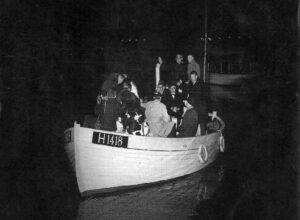
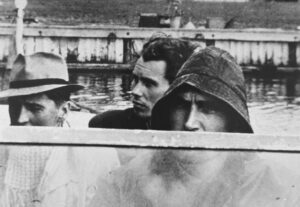 upcoming action and subtly undermined the Nazis’ attempts to stop the Danes from helping Danish Jews. Another helpful factor was that Denmark was one of the only places in Europe that had successfully integrated its Jewish population. Although there was anti-Semitism in Denmark before and after the Holocaust, the Nazis’ war on Jews was largely viewed as a war against Denmark itself.
upcoming action and subtly undermined the Nazis’ attempts to stop the Danes from helping Danish Jews. Another helpful factor was that Denmark was one of the only places in Europe that had successfully integrated its Jewish population. Although there was anti-Semitism in Denmark before and after the Holocaust, the Nazis’ war on Jews was largely viewed as a war against Denmark itself.
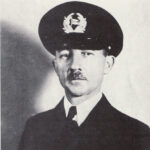
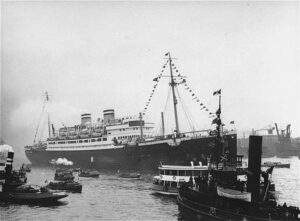 When Hitler’s reign of terror began, and the Jewish people soon realized that his goal was to wipe them from the face of the Earth, there was a mad scramble to get out of Germany and any other nation that was under Hitler’s control. Some people stayed, thinking that the war would be over soon, and many of those died. Others saw the writing on the wall, and started making plans to escape before it was too late.
When Hitler’s reign of terror began, and the Jewish people soon realized that his goal was to wipe them from the face of the Earth, there was a mad scramble to get out of Germany and any other nation that was under Hitler’s control. Some people stayed, thinking that the war would be over soon, and many of those died. Others saw the writing on the wall, and started making plans to escape before it was too late.
On May 27, 1939, a ship carrying 937 Jewish refugees was for the most part, turned away from Havana, Cuba, after admitting roughly 28 people onboard that had valid visas or travel documents. In my opinion, that was probably a blessing for those turned away, because as we all know, Cuba is not really they place that many people want to live. Nevertheless, it was a huge disappointment to the 909 Jewish refugees still on board. For seven days, the ship’s captain, Gustav Schröder, attempted to negotiate with Cuban officials, but they refused to comply. He then appealed to the United State and Canada for entry, and was also denied.
The SS Saint Louis had set sail on May 13, 1939 from Hamburg, Germany to Havana, Cuba. Six months earlier, 91 people were killed and Jewish homes, businesses, and synagogues were destroyed in what became known as the Kristallnacht massacre. It was becoming increasing clear that the Nazis were accelerating their efforts to exterminate Jews by arresting them and placing them in concentration camps. World War II and the formal implementation of The Final Solution were just months from beginning. Before they set sail, the refugees had applied for US visas, and planned to stay in Cuba until they could enter the United States legally. The Cuban government was not pleased with the planned stay in Cuba…even if it was temporary. Their impending arrival was greeted with hostility in Cuba before they even set sail. On May 8, there was a massive anti-Semitic demonstration in Havana. Right-wing newspapers claimed that the incoming immigrants were Communists.
The ship sailed closer to Florida, hoping to disembark there, but it was not permitted to dock. Some passengers attempted to cable President Franklin D Roosevelt asking for refuge, but he never responded. A State Department telegram stated that the asylum-seekers must “await their turns on the waiting list and qualify for and obtain immigration visas before they may be admissible into the United States.” As a last resort, the Saint Louis continued north to Canada, but it was rejected there, too. “No country could open its doors wide enough to take in the hundreds of thousands of Jewish people who want to leave Europe: the line must be drawn somewhere,” Frederick Blair, Canada’s director of immigration, said at the time.
After exhaustive appeals failed, the refugees were faced with no other options, the ship returned to Europe. On 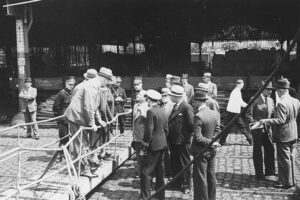
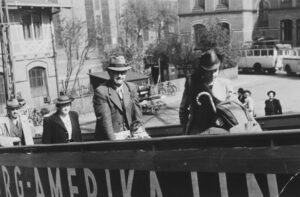 June 17, the SS Saint Louis docked in Antwerp, Belgium. By the time they arrived, several Jewish organizations had secured entry visas for the refugees in Belgium, France, the Netherlands and Great Britain. The majority of the refugees who had traveled on the ship survived the Holocaust, but 254 died as the Nazis swept through Europe during Hitler’s horrible reign.
June 17, the SS Saint Louis docked in Antwerp, Belgium. By the time they arrived, several Jewish organizations had secured entry visas for the refugees in Belgium, France, the Netherlands and Great Britain. The majority of the refugees who had traveled on the ship survived the Holocaust, but 254 died as the Nazis swept through Europe during Hitler’s horrible reign.

 When people doesn’t understand the world around themselves, huge mistakes can be made that affect the world, or at least a good part of it, for a long time. In 1958, Mao Zedong, the leader of the People’s Republic of China was about to make just such a mistake. In a move he called The Great Leap Forward, designed to reconstruct the country from an agrarian economy into large-scale industrialization. Part of this was the Four Pests campaign against flies, mosquitoes, rats, and sparrows. Now I can understand why Zedong considered flies, mosquitoes, and rats pests, but sparrows not so much, although, I suppose some people might disagree with me.
When people doesn’t understand the world around themselves, huge mistakes can be made that affect the world, or at least a good part of it, for a long time. In 1958, Mao Zedong, the leader of the People’s Republic of China was about to make just such a mistake. In a move he called The Great Leap Forward, designed to reconstruct the country from an agrarian economy into large-scale industrialization. Part of this was the Four Pests campaign against flies, mosquitoes, rats, and sparrows. Now I can understand why Zedong considered flies, mosquitoes, and rats pests, but sparrows not so much, although, I suppose some people might disagree with me.
Zedong basically told his nation to take pots and pans to kill all the sparrows. His campaign was successful. Millions of sparrows were killed, but this left crops vulnerable to locusts…normally kept under control by the sparrows. This agricultural policy, poor weather, and famine led to the deaths of 45 million people. Among all the incidents of mass murder caused by states in the 20th century, probably the least known in the English-speaking world is the Great Leap Forward of Mao Zedong. For some reason, the Great Leap Forward was considered somehow important enough to earn a place in the Black Book of Communism, in a description so horrifying it would haunt anyone who read about it.
Looking back on the process, so many things were done wrong. First, the rulers presumed to know a better path, when indeed, they knew nothing about what they were doing. Then, to make matters worse, they beat the population into submission in order that the plan could be implemented. The plan was intensified by a wild political enthusiasm among the population. For some reason, or maybe like the Nazis, the citizen enforcers were often worse than the tyrants at the top. In the famine that followed…well, most of us have no idea what went on. For example, all livestock was eaten or died, and the pillaging of property effectively ended the possibility of domesticating animals. Before long, there were no animals. Something we don’t think about, nor will I go into detail, there was no fat for cooking whatever food was left. People were dying, and well…corpses were used for fat as needed. Think about this the next time you prepare dinner. Think of cooking without oils at all, no butter, corn oil, bacon, or any other fat at all. Be thankful for markets that make oil, butter, and such. Things shouldn’t be taken for granted.
China’s “Great Leap Forward” in 1958-1961 became one of the worse disasters in human history. The dis hewn of deeply misguided industrialization and food procurement policies led to the deaths of around thirty-five million people from starvation and prevented the births of perhaps forty million more. Weather conditions were not unusual in these years; the famine was entirely man-made. Zedong and his fellow leaders were determined to show the superiority of communism, to quickly overtake production levels in Russia and in Britain, and to establish Mao’s leadership of the communist world. Outlandish production targets were set to match the food needs of rapidly industrializing cities and to earn foreign exchange through exports of food. Under the totalitarian system maintained by the Communist Party of China, rural communes competed to exaggerate their output, further inflating the already unattainable procurement quotas and leaving nothing for the people to eat. The Communist Party caused further chaos in the countryside by ordering that all private land be turned into communes, confiscating private property and even private cooking utensils, and making people eat in communal kitchens.
That, as well as the enormous increases in production that were confidently expected, peasant labor was diverted to public works projects and rural steel-making plants, which achieved nothing. Travel restrictions stopped communication, meaning word of what was going on, didn’t out from getting out. The penalties for disobedience were clear. In all, three-quarters of a million people were executed in 1950-51. Still in the early years, of the revolution, the Party was widely trusted. When Zedong learned of the disasters, you would have thought he would have taken measures to save the people, but his goal was to hide the facts. He doubled down on the policies, purging the messengers, labeling them “right-deviationists,” and blaming peasants for secretly hoarding food. Anything else would have made him look like a bad leader…at least in his own mind.
If Zedong had changed course when the extent of the mass starvation first became clear to the leadership, the famine would have lasted one year and not three, and in any case there was more than enough grain in government stores to prevent everyone from starving. Life expectancy in China, which was nearly 50 in 1958, fell to below 30 in 1960; five years later, once Mao had stopped killing people, it had risen to nearly 55. Nearly a third of those born during the Great Leap Forward did not survive it.
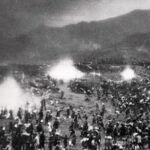

Zedong was born December 26, 1893, Shaoshan, Hunan province, China. In his political career, he was the principal Chinese Marxist theorist, soldier, and statesman who led his country’s communist revolution. Mao was the leader of the Chinese Communist Party (CCP) from 1935 until his death, and he was chairman (chief of state) of the People’s Republic of China from 1949 to 1959 and chairman of the party also until his death on September 9, 1976 in Beijing, China. I guess he survived the Great Leap Forward, unlike many of his people.
 Originally, in the United States, each branch of the service had their own day to celebrate their service, but on August 31, 1949, Defense Secretary Louis Johnson announced the creation of an Armed Forces Day to replace separate Army, Navy, Air Force, Marine Corps, and Coast Guard Days. There was a good reason for it. The combination coincided with the unification of the three branches of the service under one agency…the Department of Defense. Man countries have an Armed Forces Day, and they are all done a little differently. In the United States, Armed Forces Day is celebrated on the third Saturday in May, which is near the end of Armed Forces Week, which begins on the second Saturday of May and ends on the third Sunday of May, or the fourth Saturday if the month begins on a Sunday, such as in 2016. Following the creation of Armed Forces Day in 1949, the holiday was first observed on May 20, 1950.
Originally, in the United States, each branch of the service had their own day to celebrate their service, but on August 31, 1949, Defense Secretary Louis Johnson announced the creation of an Armed Forces Day to replace separate Army, Navy, Air Force, Marine Corps, and Coast Guard Days. There was a good reason for it. The combination coincided with the unification of the three branches of the service under one agency…the Department of Defense. Man countries have an Armed Forces Day, and they are all done a little differently. In the United States, Armed Forces Day is celebrated on the third Saturday in May, which is near the end of Armed Forces Week, which begins on the second Saturday of May and ends on the third Sunday of May, or the fourth Saturday if the month begins on a Sunday, such as in 2016. Following the creation of Armed Forces Day in 1949, the holiday was first observed on May 20, 1950.
In his speech proclaiming the day as Armed Forces Day, on February 27, 1950, President Truman stated, “Armed Forces Day, Saturday, May 20, 1950, marks the first combined demonstration by America’s defense  team of its progress, under the National Security Act, toward the goal of readiness for any eventuality. It is the first parade of preparedness by the unified forces of our land, sea, and air defense.” Of course, there is more to planning a holiday that a day and a speech. The first Armed Forces Day was celebrated by parades, open houses, receptions, and air shows. The longest continuously running Armed Forces Day Parade in the United States is held in Bremerton, Washington.
team of its progress, under the National Security Act, toward the goal of readiness for any eventuality. It is the first parade of preparedness by the unified forces of our land, sea, and air defense.” Of course, there is more to planning a holiday that a day and a speech. The first Armed Forces Day was celebrated by parades, open houses, receptions, and air shows. The longest continuously running Armed Forces Day Parade in the United States is held in Bremerton, Washington.
There were a few glitches, however. The unique training schedules of the National Guard and Reserve units make the specific Saturday celebration difficult for these branches, so they have adapted to celebrate Armed Forces Day/Week over any period in the month of May. Every nation needs to celebrate the military forces. Where would we be without a strong military. As President Truman said, “It is vital to the security of the nation and to the establishment of a desirable peace.”
Each year, Armed Forces Day theme is different, because of course, each year more and more has changed. The very first theme was “Teamed for Defense.” Over the years, other themes have included Appreciation of a Nation; Arsenal of Freedom and Democracy; Dedication and Devotion; Deter if Possible, Fight if Necessary;  Freedom; Freedom Through Unity; Guardians of Peace; Lasting Peace; Liberty; and Patriotism. In Washington DC, 10,000 troops of all branches of the military, cadets, and veterans marched past the president and his party. In New York City, an estimated 33,000 participants initiated Armed Forces Day “under an air cover of 250 military planes of all types.” Today, Armed Forces Day is celebrated in American communities and on military bases throughout the world with parades, picnics, shopping discounts, festivals, and parties. On May 19, 2017, President Donald Trump reaffirmed the Armed Forces Day holiday, marking the 70th anniversary since the creation of the Department of Defense.
Freedom; Freedom Through Unity; Guardians of Peace; Lasting Peace; Liberty; and Patriotism. In Washington DC, 10,000 troops of all branches of the military, cadets, and veterans marched past the president and his party. In New York City, an estimated 33,000 participants initiated Armed Forces Day “under an air cover of 250 military planes of all types.” Today, Armed Forces Day is celebrated in American communities and on military bases throughout the world with parades, picnics, shopping discounts, festivals, and parties. On May 19, 2017, President Donald Trump reaffirmed the Armed Forces Day holiday, marking the 70th anniversary since the creation of the Department of Defense.

 April 19, 1995 was a normal spring morning in Oklahoma City, Oklahoma, but by 9:02am, all that would change forever. This was the day that antigovernment extremists, Timothy McVeigh and Terry Nichols had chosen to tell the world that they didn’t like things going the way they were. The biggest problem was not that they wanted to protest, because that is their right, but it was the way they chose to protest that was completely criminal.
April 19, 1995 was a normal spring morning in Oklahoma City, Oklahoma, but by 9:02am, all that would change forever. This was the day that antigovernment extremists, Timothy McVeigh and Terry Nichols had chosen to tell the world that they didn’t like things going the way they were. The biggest problem was not that they wanted to protest, because that is their right, but it was the way they chose to protest that was completely criminal.
That morning, McVeigh parked a Ryder truck in front of the Alfred P Murrah Federal Building and then, he walked away. No warning was issued, because nothing was considered to be out of place, but that day about a thousand people started their day in the building, only to have their lives forever changed, or ended. The bomb went off at 9:02am, and in that moment, more than one-third of the building was destroyed, 168 people lost their lives, and about 800 were injured. The dead included 19 children in the on-site daycare facility. The blast destroyed or damaged 324 other buildings within a 16-block radius, shattered glass in 258 nearby buildings, and destroyed or burned 86 cars, causing an estimated $652 million worth of damage. In response to the attack, local, state, federal, and worldwide agencies quickly mobilized in extensive rescue. The Federal Emergency Management Agency (FEMA) activated 11 of its Urban Search and Rescue Task Forces, consisting of 665 rescue workers who assisted in rescue and recovery operations.
The investigation moved rapidly, and within 90 minutes of the explosion, McVeigh was stopped by Oklahoma Highway Patrolman Charlie Hanger for driving without a license plate and arrested for illegal weapons possession. It seems that most criminals make mistakes that lead to their downfall. Forensic evidence quickly 
 linked McVeigh and Nichols to the attacks. Nichols was arrested and within days, both were charged. Michael and Lori Fortier were later identified as co-conspirators. McVeigh, a veteran of the Gulf War and a sympathizer with the US militia movement, had detonated the Ryder rental truck filled with explosives and Nichols had assisted with the bomb’s preparation. Motivated by his dislike for the US federal government and unhappy about its handling of the Ruby Ridge incident in 1992 and the Waco siege in 1993, McVeigh timed his attack to coincide with the second anniversary of the fire that ended the siege at the Branch Davidian compound in Waco, Texas.
linked McVeigh and Nichols to the attacks. Nichols was arrested and within days, both were charged. Michael and Lori Fortier were later identified as co-conspirators. McVeigh, a veteran of the Gulf War and a sympathizer with the US militia movement, had detonated the Ryder rental truck filled with explosives and Nichols had assisted with the bomb’s preparation. Motivated by his dislike for the US federal government and unhappy about its handling of the Ruby Ridge incident in 1992 and the Waco siege in 1993, McVeigh timed his attack to coincide with the second anniversary of the fire that ended the siege at the Branch Davidian compound in Waco, Texas.
I could never understand why terrorists consider it necessary to take out so many innocent lives in order to make their grievances known. The official FBI investigation was known as “OKBOMB” involved 28,000 interviews, 3.5 short tons of evidence and nearly one billion pieces of information. The bombers were tried and convicted in 1997. McVeigh was sentenced to death, and was executed by lethal injection on June 11, 2001, at the US federal penitentiary in Terre Haute, Indiana. Nichols was sentenced to life in prison in 2004. Michael and Lori Fortier testified against McVeigh and Nichols, in exchange for a plea-deal. Michael Fortier was sentenced to 12 years in prison for failing to warn the United States government, and Lori received immunity from prosecution in exchange for her testimony. Michael was released into witness protection in 2006.
The US Congress passed the Antiterrorism and Effective Death Penalty Act of 1996, which tightened the standards for habeas corpus in the United States n response to the bombing. It also passed legislation to increase the protection around federal buildings to deter future terrorist attacks. Prior to the September 11th attacks in 2001, the Oklahoma City bombing was the deadliest terrorist attack in the history of the United 
 States, other than the Tulsa race massacre. It remains one of the deadliest acts of domestic terrorism in US history. On April 19, 2000, the Oklahoma City National Memorial was dedicated on the site of the Murrah Federal Building, commemorating the victims of the bombing. Remembrance services are held every year on April 19, at the time of the explosion.
States, other than the Tulsa race massacre. It remains one of the deadliest acts of domestic terrorism in US history. On April 19, 2000, the Oklahoma City National Memorial was dedicated on the site of the Murrah Federal Building, commemorating the victims of the bombing. Remembrance services are held every year on April 19, at the time of the explosion.

